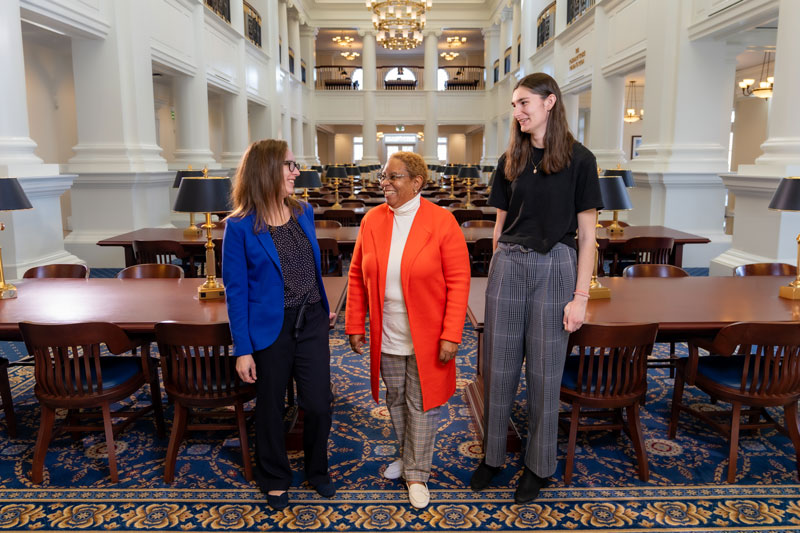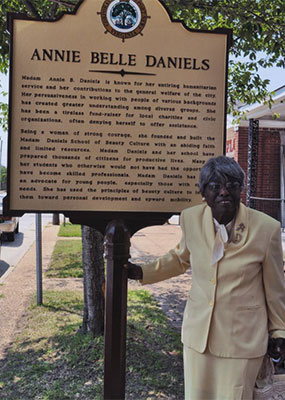
Above: Professor Laura Puaca, Annie B. Daniels' niece, Susann Davis and student Olivia Brubaker
Read time:

This is the story CNU student Olivia Brubaker learned about Annie B. Daniels: With just $10 dollars in her pocket and an abundance of faith, the fervid entrepreneur decided to open her own business.
The odds were stacked against her – after all, she was a Black woman living in a city with a deep history of segregation.
But she had a dream, and she fought to achieve it.
Daniels sharpened her entrepreneurial skills and opened the Madam Daniels Salon on Chestnut Avenue in downtown Newport News in 1958. But she had bigger plans, and in 1959, she founded the Madam Daniels School of Beauty Culture, a business that would be a fixture in the community for decades to come.
Daniels’ story is the newest addition to the Hampton Roads Oral History Project (HROHP), which was founded by Christopher Newport History Professor Dr. Laura Puaca in 2012.
Daniels’ story will join many others that are part of the ongoing project to document the lives of people who were part of the Hampton Roads community during the Civil Rights Movement, to have their stories of perseverance told and kept for generations to come to listen to and learn from. It is hoped that the stories, powered by success and hardship, will inspire and enlighten.
“There is a real need to help preserve the stories of local residents whose experiences might not be recorded elsewhere. And there is a real need to make this information available to the immediate community, as well as future generations,” Puaca said.
The project uses interviews primarily conducted by students to delve into individual people’s experiences, situating them within broader local and national narratives.
“Since the project's founding, we have learned much about the struggle for civil rights in Hampton Roads,” Puaca said. “We have heard, and documented, first-person testimonies about what it was like to live under segregation. We have learned about the process of integration. We have learned about the strength and resilience of Black communities, schools, churches, businesses, and various other institutions. Finally, we have learned about the lasting legacies of the movement, the work still undone, and the ongoing struggle for social change.”
Daniels’ story first came into focus when Brubaker, ‘24 History, was doing a research paper about African American beauty culturists and their roles in the local community for her senior seminar class. Brubaker realized that Daniels, who passed away in 2017 at the age of 100, was not only involved in the local beauty scene, but also in politics. It turns out that Daniels’ niece, Susann Davis, still lives in the area and was excited to share her aunt’s story, and to be part of the oral history project.
“This is important because it's part of who we are now,” Davis said. “I chose to participate in this project for my aunt’s sake. For Annie B. Daniels, being a person that worked hard to make society better for everyone in the community was the reason she believed God created her. It was her purpose in life. And she enjoyed telling everyone she met about it.”
Brubaker sat down with Davis in the Trible Library during Spring Break to document her story, recording the interview so it will continue to enrich people’s lives and educate them about those who came before and worked tirelessly to advance the rights of women and African Americans.
“I am pleased to see her efforts and the efforts of others remembered,” Davis said. “Segregation was part of our history as a nation but there is so much more to the story! Having the opportunity to hear from different individuals concerning how this impacted their lives adds value to all of our lives. I believe this will enhance our community.”
In addition to running a thriving business for 50 years, Daniels was active in the Democratic Party and the voting rights movement. She paid people’s poll taxes so they could vote. She held the first fundraiser for U.S. Rep. Bobby Scott, who was just getting started in politics. She valued relationships and always was looking for ways to improve the community, run a strong business, and set a positive example for young people.
“She wanted to be the person in charge of her own destiny of her own life, and she wanted to help other women do the same thing, especially Black women,” Davis said.
Learning about Daniels, Brubaker said, proved to be interesting and educational. Combining that with the idea of preserving Daniels’ story as part of the oral history project was the perfect opportunity for Brubaker to further her research.
“I jumped at the chance to participate in the project, both for the sake of my own research and the Hampton Roads Oral History Project,” she said. “Oral history projects are important primary sources because they allow for individuals’ narratives and memories to be recorded. This produces the opportunity to view the historical narrative through a lens of personal experience.”
In April, the City of Newport News will celebrate its partnership with the HROHP. As part of a new African American history initiative, the city is planning to incorporate interviews from the oral history project into local historical sites and possible curricular tools for Newport News Public Schools.
For students at Christopher Newport, the oral history project provides a lens that allows students to see the world outside of campus differently, with fresh perspective and deeper insight.
“I think it’s important for CNU to be involved in such a project because our University does not exist in a vacuum,” Brubaker said. “CNU is inherently tied to the larger Hampton Roads community, and therefore, I believe that it is important for the University to dedicate efforts to record the history of and maintain meaningful connections with the surrounding community.”